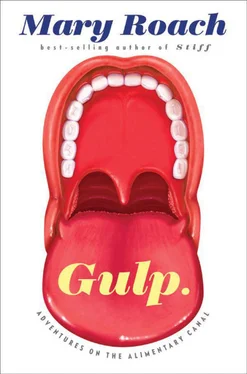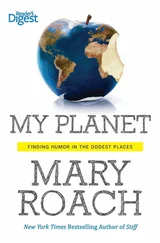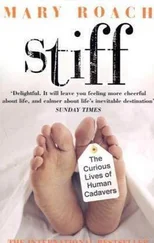Clearly some stomachs hold more than a gallon.
The only human to have come close to the poundage record set by the Liverpudlian is Takeru Kobayashi, who consumed eighteen pounds of cow brains in an eating competition. Kobayashi had a fifteen-minute time limit. Presumably he’d have bested, or worsted, or wursted, nineteen pounds had the timer not gone off. Most food records are not measured in pounds, so it is hard to know how many others have come close. Ben Monson, for instance, consumed sixty-five Mexican flautas. Who knows what the freightage was on that. I never before noted the similarity between flautas and flatus , but I bet Ben Monson has.
Bulimic models and professional eaters are career bingers. They challenge the body’s limits on a regular basis. Here is my question: Is the ability to eat to extremes a matter of practice, or are some stomachs—and I’m not saying anything here about my husband Ed—naturally more compliant?
In 2006, medical science took a look. David Metz observed the stomachs of a competitive eater—Tim Janus, then ranked number 3 on the circuit, under the name Eater X—and a six-foot-two, 210-pound control subject, while the men spent twelve minutes eating as many hotdogs as they could. A side of high-density barium enabled Metz to follow the wieners’ progress via fluoroscope. Metz had a theory I hadn’t considered: that prodigious eaters were people with faster-than-normal gastric emptying times. In other words, their stomachs might be making more room by quickly dumping food out the back door into the small intestine. The opposite turned out to be true. After two hours, Eater X’s stomach had emptied only a fourth of what he’d eaten, whereas the control eater’s stomach, more in keeping with a typical stomach, had cleared out three-fourths.
Somewhere into the seventh dog, the control eater reported to Metz that he would be sick if he ate another bite. His stomach, on the fluoroscope, was barely distended beyond its starting size. Eater X, by contrast, effortlessly consumed thirty-six hotdogs, taking them down in pairs. His stomach, on the fluoroscope, became “a massively distended, food-filled sac occupying most of the upper abdomen.” He claimed to feel no pain or nausea. He didn’t even feel full.
But the question remains: Are prodigious eaters born with a naturally compliant stomach, or do they alter the organ over years of incremental stretching—the digestive version of the tribal lip plate? Is the lack of discomfort there from the start, or does it come from habitually overriding the brain’s signals? The implication, for the rest of us, being that the more you overeat, the more you overeat.
By happenstance, a friend of mine is acquainted with Erik Denmark—aka Erik the Red, ranked number 7 nationally—and offered to put us in touch. (The two had met on the set of dLifeTV, a show about living with diabetes. That a diabetic man holds the record for fry-bread consumption is yet one more mystery of professional eating.) I asked Denmark, Is the successful glutton born or built? Both, it seems. Denmark recalled visits to McDonald’s as a child, where he would finish, by himself, the twenty-piece family box of Chicken McNuggets. But Metz had the impression, based on conversations with Eater X, that nature trumped nurture. “It’s a structural thing,” he told me. “At rest their stomachs are not much bigger, but their ability to receptively relax is unbelievable. The stomach just expands and expands and expands.”
Though Denmark agrees with Metz that genes matter—as he puts it, “very few people could eat sixty hotdogs no matter how hard they worked at it”—he considers the inherently stretchy stomach merely the foundation, the starting point, for a career that requires daily practice and training. “I think,” he told me, “that it has more to do with how much you’re willing to push your body past the point that you would ever want to go.” Despite his natural assets, Erik the Red did not hit the ground running. At his first competition, he put away just under three pounds to the winner’s six pounds. (In relating the story, Denmark does not bother to mention what the food had been. It doesn’t seem to matter. Flavor fatigue sets in after three to five minutes; beyond that point everything is more or less equally revolting.) [65] With one exception. While the consumption record for many foods exceeds eight and even ten pounds, no one has ever been able to eat more than four pounds of fruit cake.
I asked Denmark why the body’s safety mechanisms, specifically regurgitation, don’t kick in. In fact, they do. “This is going to sound gross,” he said, “but you just, you know, like, swallow it down and keep eating.” Major-league eating judges define regurgitation as the point at which food comes out, not up. “It’s like a speed bump that you just go over. It’s mental.” Yes.
All competitive eaters follow a conditioning regimen. The cheapest and least fattening training material is water. Denmark can water-load about two gallons at a sitting. When he began his career, he could barely get through one. As a point of reference—and warning—recall that one gallon was the point at which Key-Åberg’s cadavers’ stomachs began to rupture. Part of this training is psychological. In addition to stretching the stomach, water-loading gets the competitor accustomed to the feeling of being grotesquely full.
David Metz has a theory, yet untested, that water-loading could be used as a therapy for dyspeptics—people whose stomachs hurt after a meal, though they appear to be healthy. A 2007 study showed that dyspeptic patients report feeling full after drinking significantly less water, as compared with a control group of healthy, nondyspeptic volunteers. Could these people take a cue from professional eaters and gradually train themselves—by conditioning their stomachs—to comfortably hold more? “I think it would be a worthwhile project,” Metz says.
Additional support for the incremental stretching theory comes from the other end of the eating spectrum—the starvation end. A surgeon-commander by the name of Markowski noted in a 1947 British Medical Journal paper that the stomachs of the World War II prisoners he treated were stretched from the large volumes of low-quality food they needed to eat to get enough calories and nutrients to survive. He surmised that the chronic stretching might weaken the organ, and that this explained why the men’s stomachs sometimes ruptured after relatively small meals. Though if this were true, you’d expect to see stomach ruptures in major-league eaters, and you don’t. I would have assumed that the prisoners’ stomachs had shrunk, and that that was why they ruptured. I asked Metz about this. He dismissed the notion that people’s stomachs shrink if they skip meals or cut way back on how much they consume. He says that when people say they feel full more quickly after eating less, it is because their tolerance for food is diminished; the feedback loops that are stimulated for hormone and enzyme production don’t work as well.
Here is what surprises me: people with capacious stomachs are no more likely to be obese. A study in the journal Obesity Surgery reported no significant differences in the size of the stomachs of morbidly obese people as compared with non-obese control subjects. It is hormones and metabolism, calories consumed and calories burned, that determine one’s weight, not holding capacity. Erik the Red insists he does not—outside of competitions—overeat, even though he never feels full. He points out that however much willpower it takes to stop eating when you’re full, it takes far more to keep going (and going).
The biggest surprise of all is that the medical literature does not contain a single case report of stomach rupture among competitive eaters. Which brings us full circle to Mr. L. and my original point. By and large, it’s not how much you eat that kills you, it’s what you eat—especially, as we’re about to see, when what you are eating is ten dozen latex bundles of cocaine.
Читать дальше












